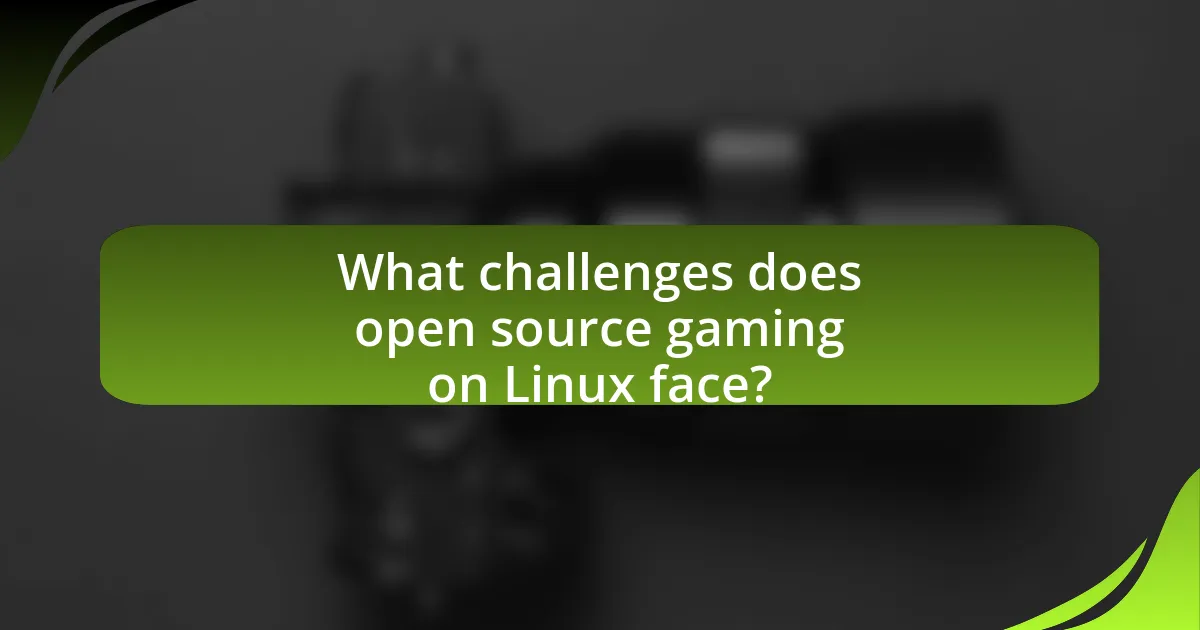The article focuses on the future of open source gaming on the Linux platform, highlighting its growth driven by community support and technological advancements. It defines open source gaming within the Linux ecosystem, emphasizing characteristics such as accessibility, community-driven development, and modifiability. Key challenges, including compatibility issues and funding constraints, are discussed alongside the opportunities presented by increased collaboration and the rise of indie game development. The article also explores emerging technologies and innovations that are shaping the landscape of open source gaming, as well as practical steps gamers can take to support this ecosystem.

What is the Future of Open Source Gaming on Linux?
The future of open source gaming on Linux is promising, driven by increasing community support and advancements in technology. The Linux gaming market has seen significant growth, with platforms like Steam supporting a wider range of Linux-compatible games, evidenced by the Steam Hardware Survey indicating a steady rise in Linux user adoption. Additionally, projects like Proton and Wine have enhanced compatibility for Windows games on Linux, further expanding the gaming library available to users. The collaborative nature of open source development fosters innovation, allowing developers to create unique gaming experiences that are not constrained by commercial interests. As more developers recognize the potential of Linux as a gaming platform, the ecosystem is likely to flourish, attracting both indie and mainstream titles.
How is open source gaming defined within the Linux ecosystem?
Open source gaming within the Linux ecosystem is defined as video games whose source code is made publicly available, allowing users to modify, distribute, and collaborate on the software. This definition is rooted in the principles of transparency and community-driven development, which are foundational to the Linux operating system itself. Notable examples include games like “0 A.D.” and “Battle for Wesnoth,” which not only exemplify this model but also demonstrate the viability of open source games in providing quality entertainment comparable to proprietary titles. The growth of platforms like Steam for Linux further supports this ecosystem by facilitating access to a wider audience, thereby enhancing the open source gaming landscape.
What are the key characteristics of open source games on Linux?
Open source games on Linux are characterized by their accessibility, community-driven development, and modifiability. These games are typically available for free, allowing users to download, play, and share them without cost. Community-driven development means that players can contribute to the game’s code, report bugs, and suggest features, fostering a collaborative environment. Modifiability allows users to alter game assets and mechanics, leading to a diverse range of user-generated content. For instance, popular open source games like “0 A.D.” and “Battle for Wesnoth” exemplify these characteristics by being actively developed by communities and offering extensive modding capabilities.
How does the open source model differ from proprietary gaming?
The open source model differs from proprietary gaming primarily in terms of accessibility and control over the software. In open source gaming, the source code is publicly available, allowing anyone to modify, distribute, and improve the game, fostering community collaboration and innovation. In contrast, proprietary gaming restricts access to the source code, limiting modifications and requiring users to purchase licenses, which can stifle creativity and community involvement. For example, games like “0 A.D.” and “Battle for Wesnoth” exemplify successful open source projects that thrive on community contributions, while proprietary titles like “Call of Duty” and “FIFA” maintain strict control over their content and distribution. This fundamental difference shapes the development, distribution, and user engagement in the gaming industry.
Why is Linux a significant platform for open source gaming?
Linux is a significant platform for open source gaming due to its flexibility, community support, and cost-effectiveness. The open-source nature of Linux allows developers to modify and distribute their games freely, fostering innovation and collaboration within the gaming community. Additionally, Linux supports a wide range of programming languages and tools, making it accessible for indie developers and hobbyists. According to the Steam Hardware Survey, as of October 2023, Linux users represent a growing segment of the gaming market, indicating increasing interest and investment in Linux-based gaming solutions. This trend is further supported by platforms like Steam and itch.io, which provide a marketplace for Linux games, enhancing visibility and accessibility for developers and players alike.
What advantages does Linux offer to game developers?
Linux offers several advantages to game developers, including cost-effectiveness, flexibility, and a strong community support system. The operating system is open-source, which allows developers to modify and optimize the software according to their specific needs without incurring licensing fees. This flexibility enables developers to create tailored gaming experiences and optimize performance for various hardware configurations. Additionally, the Linux community is active and collaborative, providing resources, forums, and documentation that facilitate problem-solving and innovation. According to the Steam Hardware Survey, as of October 2023, Linux has gained traction among gamers, with a growing percentage of users, indicating a viable market for developers targeting this platform.
How does the Linux community support open source gaming initiatives?
The Linux community supports open source gaming initiatives through collaborative development, advocacy for open standards, and the creation of gaming platforms. Community-driven projects like Steam for Linux and Lutris provide gamers with access to a wide range of open source titles and compatibility layers, enhancing the gaming experience on Linux systems. Additionally, organizations such as the Free Software Foundation promote the importance of free software in gaming, encouraging developers to create and share their games under open licenses. This support is evidenced by the increasing number of open source games available, with platforms like itch.io hosting numerous titles that are freely accessible and modifiable.
What trends are shaping the future of open source gaming on Linux?
The future of open source gaming on Linux is being shaped by several key trends, including increased community collaboration, the rise of cross-platform compatibility, and advancements in graphics and performance optimization. Community collaboration is fostering a vibrant ecosystem where developers contribute to projects like Godot and OpenRA, enhancing game quality and variety. Cross-platform compatibility is becoming essential, as tools like Proton and Steam Play enable Linux users to access a broader range of games, bridging the gap between Linux and other operating systems. Furthermore, advancements in graphics technologies, such as Vulkan, are improving performance and visual fidelity in open source games, making them more appealing to a wider audience. These trends collectively indicate a promising trajectory for open source gaming on Linux, supported by a growing user base and developer engagement.
How is the rise of indie game development influencing Linux gaming?
The rise of indie game development is significantly enhancing Linux gaming by increasing the availability of diverse titles and fostering community engagement. Indie developers often prioritize cross-platform compatibility, leading to a greater number of games being released for Linux, which historically has had a smaller library compared to Windows. For instance, platforms like Steam have reported a steady increase in the number of indie games available on Linux, with over 5,000 titles listed as of 2023. This influx not only broadens the gaming options for Linux users but also encourages more developers to consider Linux as a viable platform, further driving innovation and support within the ecosystem.
What role do emerging technologies play in the evolution of open source gaming?
Emerging technologies significantly enhance the evolution of open source gaming by enabling more sophisticated game development tools, improving accessibility, and fostering community collaboration. Technologies such as cloud computing allow developers to leverage scalable resources for game hosting and distribution, while advancements in artificial intelligence facilitate more dynamic and responsive gameplay experiences. Additionally, the rise of blockchain technology introduces new models for game monetization and ownership, empowering players with true asset ownership. These innovations not only streamline the development process but also attract a broader audience, as seen in the increasing number of open source projects that utilize these technologies, thereby driving the growth and sustainability of the open source gaming ecosystem.

What challenges does open source gaming on Linux face?
Open source gaming on Linux faces several significant challenges, primarily related to compatibility, funding, and community support. Compatibility issues arise because many popular games are developed for Windows, leading to a lack of native support for Linux, which limits the gaming library available to Linux users. Funding is another challenge, as many open source projects rely on donations or volunteer contributions, which can hinder the development of high-quality games. Additionally, community support can be inconsistent, as the open source model often depends on active contributors, and a lack of engagement can stall project progress. These challenges collectively impact the growth and sustainability of open source gaming on the Linux platform.
How do compatibility issues affect open source games on Linux?
Compatibility issues significantly hinder the performance and accessibility of open source games on Linux. These issues arise from differences in hardware support, software dependencies, and varying distributions of the Linux operating system, which can lead to inconsistent user experiences. For instance, many open source games rely on specific libraries or graphics drivers that may not be universally available or optimized across all Linux distributions. This fragmentation can result in crashes, graphical glitches, or even complete failure to run the game. Additionally, the lack of standardized support for certain game engines can further complicate development and distribution, limiting the potential player base and stifling community engagement.
What are the most common compatibility challenges for gamers?
The most common compatibility challenges for gamers include hardware limitations, software incompatibility, and driver issues. Hardware limitations arise when gaming peripherals or components are not supported by the operating system, particularly in Linux environments where certain devices may lack native support. Software incompatibility occurs when games are not designed to run on Linux, leading to reliance on compatibility layers like Wine, which can introduce performance issues. Driver issues often stem from the lack of optimized graphics drivers for Linux, which can hinder performance and graphical fidelity in games. These challenges are well-documented in various gaming forums and studies, highlighting the ongoing struggle for Linux gamers to achieve a seamless gaming experience.
How can developers address these compatibility issues?
Developers can address compatibility issues by implementing cross-platform frameworks and utilizing compatibility layers. Cross-platform frameworks, such as Unity or Godot, allow developers to write code that runs on multiple operating systems, including Linux, thereby reducing compatibility problems. Compatibility layers like Wine enable Windows applications to run on Linux by translating Windows API calls into POSIX calls, which further enhances the usability of games on Linux. According to a 2021 report by the Steam Hardware Survey, the number of Linux users has increased, indicating a growing market that necessitates improved compatibility solutions.
What funding and support challenges exist for open source gaming projects?
Open source gaming projects face significant funding and support challenges primarily due to a lack of sustainable financial models. Many developers rely on community donations or crowdfunding, which can be unpredictable and insufficient for long-term project viability. According to a 2021 survey by the Open Source Initiative, 70% of open source projects struggle with funding, highlighting the difficulty in securing consistent financial backing. Additionally, the absence of commercial incentives often leads to limited marketing and visibility, making it harder to attract contributors and users. This lack of visibility further exacerbates funding issues, as potential supporters may not be aware of the project’s existence or its needs.
How do financial constraints impact game development on Linux?
Financial constraints significantly limit game development on Linux by reducing the resources available for hiring skilled developers, acquiring necessary software tools, and marketing the final product. Developers often face challenges in securing funding, which can lead to smaller teams and less ambitious projects. For instance, a study by the International Game Developers Association in 2021 indicated that 60% of independent developers reported financial limitations as a primary barrier to project completion. This lack of funding can hinder the ability to optimize games for Linux, resulting in fewer high-quality titles available on the platform.
What alternative funding models are being explored for open source games?
Alternative funding models being explored for open source games include crowdfunding, subscription services, and community sponsorship. Crowdfunding platforms like Kickstarter and Indiegogo allow developers to raise funds directly from supporters, enabling them to finance their projects without traditional publishers. Subscription services, such as Patreon, provide ongoing financial support from fans in exchange for exclusive content or early access. Community sponsorship involves organizations or individuals providing financial backing in return for branding opportunities or recognition within the game. These models are gaining traction as they align with the collaborative ethos of open source development, allowing creators to maintain control over their projects while securing necessary funding.

What opportunities lie ahead for open source gaming on Linux?
Open source gaming on Linux has significant opportunities ahead, particularly due to the increasing support from major game engines and platforms. The adoption of Linux by developers is growing, as evidenced by the rise of platforms like Steam, which reported that over 25% of its users are on Linux as of 2023. This trend encourages more developers to create and port games to Linux, expanding the gaming library available to users. Additionally, the collaborative nature of open source allows for rapid innovation and community-driven projects, which can lead to unique gaming experiences that are not possible in proprietary environments. The ongoing improvements in Linux gaming performance and compatibility, driven by projects like Proton and Wine, further enhance the viability of open source gaming on this platform.
How can collaboration enhance the open source gaming landscape?
Collaboration can significantly enhance the open source gaming landscape by pooling diverse skills and resources, leading to more innovative and robust game development. When developers, artists, and designers work together, they can share knowledge, improve code quality, and accelerate project timelines. For instance, collaborative platforms like GitHub allow multiple contributors to work on a single project simultaneously, facilitating rapid iteration and feedback. This collective effort can result in higher-quality games that are more engaging and feature-rich, as seen in successful open source projects like 0 A.D. and OpenRA, which thrive on community contributions and shared expertise.
What partnerships are forming between developers and communities?
Partnerships are forming between developers and communities in the open source gaming sector on Linux through collaborative projects and shared resources. For instance, developers are increasingly engaging with community-driven platforms like GitHub to co-create games, allowing for direct feedback and contributions from players. This collaboration enhances game development by leveraging community expertise and fostering a sense of ownership among users. Additionally, initiatives such as the Steam for Linux platform have encouraged developers to work closely with the Linux community to optimize gaming experiences, resulting in a broader range of titles available for Linux users. These partnerships are validated by the growing number of successful open source games, such as “0 A.D.” and “SuperTuxKart,” which have thrived due to active community involvement and developer support.
How can cross-platform development benefit Linux gaming?
Cross-platform development can significantly benefit Linux gaming by increasing the accessibility and availability of games on the platform. This approach allows developers to create games that run on multiple operating systems, including Linux, thereby expanding the potential user base. For instance, according to the Steam Hardware Survey, as of October 2023, Linux users represent approximately 1.5% of the gaming market, which can be enhanced through cross-platform support. By leveraging tools like Unity and Unreal Engine, developers can streamline the process of porting games to Linux, making it more feasible to release titles that might otherwise be exclusive to Windows or consoles. This not only fosters a more diverse gaming ecosystem but also encourages more developers to consider Linux as a viable platform for their games.
What innovations are expected in open source gaming technology?
Innovations expected in open source gaming technology include enhanced graphics engines, improved cross-platform compatibility, and advanced AI integration. These advancements are driven by community collaboration and contributions, which allow for rapid development and iteration. For instance, projects like Godot Engine have introduced features such as Vulkan support, enabling better performance and visual fidelity. Additionally, tools like Steam’s Proton have improved compatibility for running Windows games on Linux, showcasing the potential for broader access to gaming libraries. Furthermore, the integration of machine learning algorithms in game development is anticipated to create more dynamic and responsive gameplay experiences, reflecting the ongoing evolution of open source technologies in the gaming sector.
How might advancements in graphics and performance impact Linux games?
Advancements in graphics and performance significantly enhance Linux games by improving visual fidelity and gameplay smoothness. Enhanced graphics capabilities allow developers to create more immersive environments, which can attract a larger player base. For instance, the introduction of Vulkan, a low-overhead graphics API, has enabled better performance and efficiency in rendering, leading to higher frame rates and reduced latency in Linux games. Additionally, improved hardware compatibility and performance optimizations can lead to a broader range of games being playable on Linux, as seen with the increasing support for AAA titles on the platform. This trend is supported by statistics showing that the Steam gaming platform reported a 30% increase in Linux gaming activity following major graphics updates and optimizations.
What new tools are being developed to support open source game creation?
New tools being developed to support open source game creation include Godot Engine 4.0, which offers enhanced 2D and 3D capabilities, and the OpenRA project, which revitalizes classic real-time strategy games with modern features. Godot Engine 4.0 introduces a new rendering engine, improved animation systems, and a more user-friendly interface, making it easier for developers to create games. OpenRA allows developers to modify and create games based on classic titles, fostering a community-driven approach to game development. These tools exemplify the ongoing innovation in the open source gaming space, particularly on Linux platforms, where accessibility and collaboration are prioritized.
What practical steps can gamers take to support open source gaming on Linux?
Gamers can support open source gaming on Linux by actively participating in community development, contributing code, testing software, and providing feedback. Engaging with projects on platforms like GitHub allows gamers to report bugs, suggest features, and help improve existing games. Additionally, gamers can donate to open source projects or purchase games that are released under open source licenses, which directly funds development efforts. Supporting Linux-compatible hardware and advocating for open source titles within gaming communities also fosters a more robust ecosystem. According to the Open Source Initiative, open source software promotes collaboration and innovation, which is essential for the growth of gaming on Linux.
How can users contribute to open source projects effectively?
Users can contribute to open source projects effectively by actively participating in coding, documentation, and community engagement. Engaging in coding involves reviewing existing code, fixing bugs, and adding new features, which enhances the project’s functionality. Contributing to documentation helps improve user understanding and accessibility, as clear instructions and guidelines are essential for new users. Additionally, community engagement through forums, discussions, and social media fosters collaboration and support among contributors. According to the Open Source Initiative, projects with active community involvement tend to have higher success rates and sustainability, demonstrating the importance of user contributions in open source ecosystems.
What resources are available for gamers interested in open source titles?
Gamers interested in open source titles can access various resources, including dedicated websites, forums, and repositories. Websites like GitHub host numerous open source games, allowing users to download, contribute, and modify titles. Additionally, platforms such as Itch.io feature a section for open source games, providing a user-friendly interface for discovery. Forums like Reddit’s r/opensourcegaming offer community support and recommendations, while the Open Source Game Development Wiki serves as a comprehensive resource for developers and players alike. These platforms collectively enhance the accessibility and visibility of open source gaming options.



